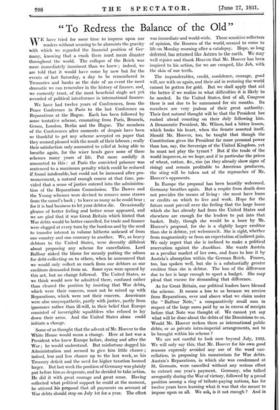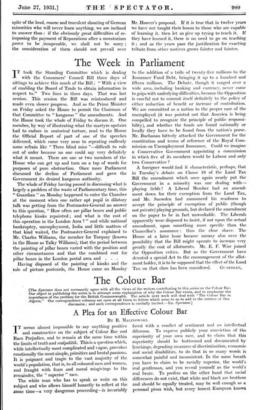"To Redress the Balance of the Old " W E have
tried for some time to impress upon our readers without seeming to be alarmists the gravity with which we regarded the financial position of Ger- many, knowing that a crash there must mean disaster throughout the world. The collapse of the Reich was more immediately imminent than we knew ; indeed, we are told that it would have come by now but for the events of last Saturday, a day to be remembered in Treasuries and banks as the date of an event the most dramatic we can remember in the history of finance, and, we earnestly trust, of the most beneficial single act yet recorded of political interference in international finance.
We have had twelve years of Conferences, from the Peace Conference in Paris to the last Conference on Reparations at the Hague. Each has been followed by some tentative scheme, emanating from Paris, Brussels, Genoa, London, Berlin and the Hague. The members of the Conferences after moments of despair have been so thankful to get any scheme accepted on paper that they seemed pleased with the result of their labours ; really their satisfaction only amounted to relief at being able to breathe again, for the wiser heads gave none of these schemes many years of life. Put more sordidly it amounted to this : at Paris the convicted prisoner was sentenced to a maximum penalty which could be reduced if found intolerable, but could not be increased after pro- nouncement, a natural enough course at that time, pro- vided that a sense of justice entered into the administra- tion of the Reparations Commission. The Dawes and the Young schemes were devised to remove some straws from the camel's back ; to leave as many as he could bear ; for it is bad business to let your debtor die. Occasionally gleams of better feeling and better sense appeared, and we are glad that it was Great Britain which hinted that War debts would be better cancelled, for trade and finance were clogged at every turn by the burdens and by the need to transfer interest in volume hitherto unheard of from one country and one currency to another. We, as heavy debtors to the United States, were decently diffident about proposing any scheme for cancellation. Lord Balfour risked the blame for meanly putting the odium for debt-collecting on to others, when he announced that we would only collect so much from our debtors as our creditors demanded from us. Some eyes were opened by this act, but no change followed. The United States, as we think would now be admitted there, confused rather than cleared the position by insisting that War debts, which were their concern, must not be mixed up with Reparations, which were not their concern. Americans were also unsympathetic, partly with justice, partly from ignorance rather than in their belief that Europe consisted of incorrigible squabblers who refused to lay down their arms. And the United States alone could initiate a change.
Some of us thought that the advent of Mr. Hoover to the White House would mean a change. Here at last was a President who knew Europe before, during and after the War ; he would understand. But misfortune dogged his Administration and seemed to give him little chance ; indeed, less and less chance up to the last week, as his Treasury deficit and the need for higher taxation loomed larger. But last week the position of Germany was plainly put before him as desperate, and he decided to take action. He did it with great courage and great sense. Having collected what political support he could at the moment, he uttered his proposal that all payments on account of War debts should stop on July 1st for a year. The effect was immediate and world-wide. Those sensitive reflectors of opinion, the Bourses of the world, seemed to come to life on Monday morning after a catalepsy. Hope, so long deferred, has returned like Astrwa to the earth. We may well rejoice and thank Heaven that Mr. Hoover has been inspired to his action, for we are escaped, like Job, with the skin of our teeth.
The imponderables, credit, confidence, courage, good will, are with us again, and their aid in restoring the world cannot be gotten for gold. But we shall apply that aid the better if we realize in what difficulties it is likely to be needed. In the United States, first of all, Congress there is not due to be summoned for six months. Its members are very jealous of their great authority. Their first natural thought will be that the President has rushed ahead counting on their duly following him. A Democratic President, Mr. Wilson, had a bitter lesson, which broke his heart, when the Senate asserted itself. Should Mr. Hoover, too, be taught that though the Constitution gives the President far more personal power than has, say, the Sovereign of the United Kingdom, yet he must not play the tyrant ? But if the trade of the world improves, as we hope, and if in particular the prices of wheat, cotton, &c., rise (as they already show signs of rising) and remain profitable to American producers, the sting will be taken out of the reproaches of Mr. Hoover's opponents.
In Europe the proposal has been heartily welcomed. Germany breathes again. But a respite from death does not provides the means of living : she must have loans or credits on which to live and work. Hope for the future must prevail over the feeling that the large loans which she has already had from the United States and elsewhere are enough for the lenders to put into that basket. Italy, though she would be a loser by Mr. Hoover's proposal, for she is a slightly larger creditor than she is debtor, yet welcomes it. She is right, whether from magnanimity or from an expectation of indirect gain. We only regret that she is inclined to make a political reservation against the Anschluss. She wants Austria as a peculiar market of her own, and fears to lose it by Austria's absorption within the German Reich. France, too, has spoken well, but she is a substantially greater creditor than she is debtor. The loss of the difference due to her is large enough to upset a budget. She may plead that excuse for demanding that difference.
As for Great Britain, our political leaders have blessed the scheme. It means a loss to us because we receive from Reparations, over and above what we claim under the " Balfour Note," a comparatively small sum in respect of the large sums paid by us in excess of receipts before that Note was thought of. We cannot yet say what will be done about the debts of the Dominions to us. Would Mr. Hoover reckon them as international public debts, or as private intra-imperial arrangements, not to be brought within his scheme ?
We are not careful to look • now beyond July, 1932. We will only say this, that Mr. Hoover for his own good reasons expressly avoided any use of the word can- cellation, in proposing his moratorium for War debts. Austria's Reparations, in which she was condemned at St. Germain, were cancelled without any serious effort to extract one year's payment. Germany, who talked arrogantly during the War of victory, followed by a proud position among a ring of tribute-paying nations, has for twelve years been learning what it was that she meant to impose upon us all. We ask, is it not enough ? And in spite of the loud, coarse and truculent shouting of German minorities who will never learn anything, we are inclined to answer thus : if the obviously great difficulties of re- imposing the payment of Reparations after a moratorium prove to be ;insuperable, we shall not be sorry ; the consideration of them should not prevail over Mr. Hoover's proposal. If it is true that in twelve years we have not taught their lesson to those who are capable of learning it, then let us give up trying to teach it. If they have learned it, there is no need to go on teaching it ; and as the years pass the justification for exacting tribute from other motives grows fainter and fainter.







































 Previous page
Previous page